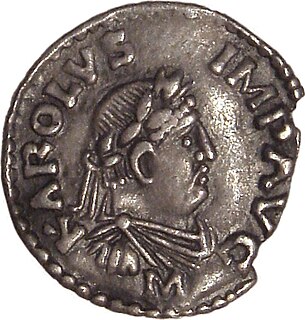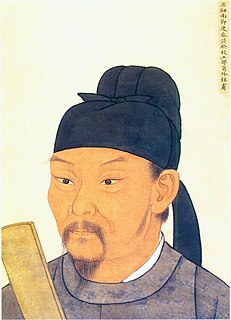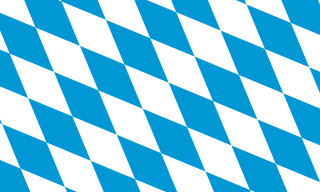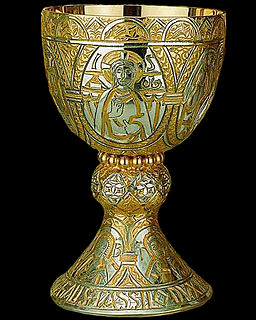
Charlemagne or Charles the Great, a member of the Carolingian Dynasty, was King of the Franks from 768, King of the Lombards from 774, and the first Holy Roman Emperor from 800. Charlemagne succeeded in uniting the majority of western and central Europe and was the first recognized emperor to rule from western Europe since the fall of the Western Roman Empire around three centuries earlier. The expanded Frankish state that Charlemagne founded was known as the Carolingian Empire. He was canonized by Antipope Paschal III— an act later treated as invalid—and he is now regarded by some as beatified in the Catholic Church.
Pope Adrian I was the bishop of Rome and ruler of the Papal States from 1 February 772 to his death. He was the son of Theodore, a Roman nobleman.
Pope Stephen III was the bishop of Rome and ruler of the Papal States from 7 August 768 to his death. Stephen was a Benedictine monk who worked in the Lateran Palace during the reign of Pope Zachary. In the midst of a tumultuous contest by rival factions to name a successor to Pope Paul I, Stephen was elected with the support of the Roman officials. He summoned the Lateran Council of 769, which sought to limit the influence of the nobles in papal elections. The Council also opposed iconoclasm.
The 770s decade ran from January 1, 770, to December 31, 779.

Year 770 (DCCLXX) was a common year starting on Monday of the Julian calendar. The denomination 770 for this year has been used since the early medieval period, when the Anno Domini calendar era became the prevalent method in Europe for naming years.

Carloman I, also Karlmann, was king of the Franks from 768 until his death in 771. He was the second surviving son of Pepin the Short and Bertrada of Laon and was a younger brother of Charlemagne. His death allowed Charlemagne to take all of Francia and begin his expansion into other kingdoms.

Desiderius, also known as Daufer or Dauferius, was king of the Lombards in northern Italy, ruling from 756 to 774. He is chiefly remembered for his connection to Charlemagne, who married his daughter and conquered his realm. Desiderius was the last Lombard ruler to exercise regional kingship.

The Siege or Battle of Pavia was fought in 773–774 in northern Italy, near Ticinum, and resulted in the victory of the Franks under Charlemagne against the Lombards under King Desiderius.

Aistulf was the Duke of Friuli from 744, King of the Lombards from 749, and Duke of Spoleto from 751. His reign was characterized by ruthless and ambitious efforts to conquer Roman territory to the extent that in the Liber Pontificalis, he is described as a "shameless" Lombard given to "pernicious savagery" and cruelty.

Pepin or Pippin, born Carloman, was the son of Charlemagne and King of the Lombards (781–810) under the authority of his father.

The Duchy of Bavaria was a frontier region in the southeastern part of the Merovingian kingdom from the sixth through the eighth century. It was settled by Bavarian tribes and ruled by dukes (duces) under Frankish overlordship. A new duchy was created from this area during the decline of the Carolingian Empire in the late ninth century. It became one of the stem duchies of the East Frankish realm which evolved as the Kingdom of Germany and the Holy Roman Empire.

Tassilo III was the duke of Bavaria from 748 to 788, the last of the house of the Agilolfings.
Desiderata, was a Queen consort of the Franks. She was one of four daughters of Desiderius, King of the Lombards, and his wife Ansa, Queen of the Lombards. She was married to Charlemagne in 770, in order for him to create a bond between Francia and the Kingdom of the Lombards and attempt to isolate his brother Carloman I who ruled over the central territories of Francia. The marriage lasted just one year and there are no known children from the marriage.

Adalgis or Adelchis was an associate king of the Lombards from August 759, reigning with his father, Desiderius, until their deposition in June 774. His mother was Ansa. He is also remembered today as the hero of the play Adelchi (1822) by Alessandro Manzoni.
Pepin, or Pippin the Hunchback was a Frankish prince. He was the eldest son of Charlemagne and noblewoman Himiltrude. He developed a humped back after birth, leading early medieval historians to give him the epithet "hunchback". He lived with his father's court after Charlemagne dismissed his mother and took another wife, Hildegard. Around 781, Pepin's half brother Carloman was rechristened as "Pepin of Italy"—a step that may have signaled Charlemagne's decision to disinherit the elder Pepin, for a variety of possible reasons. In 792, Pepin the Hunchback revolted against his father with a group of leading Frankish nobles, but the plot was discovered and put down before the conspiracy could put it into action. Charlemagne commuted Pepin's death sentence, having him tonsured and exiled to the monastery of Prüm instead. Since his death in 811, Pepin has been the subject of numerous works of historical fiction.
Gerberga was the wife of Carloman I, King of the Franks, and sister-in-law of Charlemagne. Her flight to the Lombard kingdom of Desiderius following Carloman's death precipitated the last Franco-Lombard war, and the end of the independent kingdom of the Lombards in 774.
Drogo was a Frankish nobleman of the Pippinid family and the eldest son of Carloman, mayor of the palace of Austrasia under the Merovingian king Childeric III. He succeeded to his father's office in 747, but was soon squeezed out of power by his uncle, Pippin III, the mayor in Neustria. He resisted his uncle's takeover, but in 753 was captured and forced to become a monk.
Hunald II, also spelled Hunold, Hunoald, Hunuald or Chunoald, was the Duke of Aquitaine from 768 until 769. He was probably the son of Duke Waiofar, who was assassinated on the orders of King Pippin the Short in 768. He laid claim to the duchy following Pippin's death later that year, but his revolt was crushed by Pippin's eldest son, Charlemagne. Hunald fled to the Duchy of Gascony, but he was handed over to Charlemagne and put into captivity. Nothing more is heard of him.
Creontius, sometimes Germanized Crantz, was a Bavarian official and historian.
Wilchar was the archbishop of the province of the Gauls, succeeding Chrodegang after 766 as the leading bishop in the kingdom of the Franks. Before receiving the pallium, he ruled a suburbicarian diocese in Rome. As archbishop, he held the diocese of Sens for a time (762/769–772/778) and afterwards held authority over all Gaul without a fixed see.